I'm creating a smart home integration. I'm up to the testing on device step - attempting to sign in to an account to add the device.
https://developers.google.com/actions/smarthome/#syncing_devices
I've setup the assistant to retrieve an OAuth token:
And this works - on my test device I can open: Settings > Home Control > Add Device and see my project. I can then also sign in with OAuth. However the next step is Google then should "Assistant sends an action.devices.SYNC intent to your fulfillment"
From the docs:
User set up their devices with the Google Assistant app to authenticate to your cloud services and the Assistant receives an OAuth token. At this point, the Assistant sends an action.devices.SYNC intent to your fulfillment to retrieve the initial list of user devices and capabilities from your cloud infrastructure.
Fulfilment is setup correctly:
My fulfilment looks like this:
exports.helloWorld = functions.https.onRequest((request, response) => {
const requestId = request.requestId;
if(request.inputs == null) {
console.log("unexpected request " + util.inspect(request, false, null));
console.log("unexpected request id " + requestId);
response.send(400);
return;
}
const userId = request.get("Authorization");
... etc do other stuff then return correct response as a 200
I have checked the cloud function logs and the above fulfilment is called. However the documentation says it will send a action.devices.SYNC intent and it does not. (Therefore never getting past that first if statement).
It sends something that I don't recognise (and I don't see documented that I should recognise):
(every request should have a request id - and this one does not: request id undefined)

Any idea's at all?
From the comments, here is the stackdriver log:
{
insertId: "000000-751089a4-XXXX-XXXX-XXXX-f6a11a39b4d5"
labels: {
execution_id: "vXXXXsnaopim"
}
logName: "projects/XXXXX/logs/cloudfunctions.googleapis.com%2Fcloud-functions"
receiveTimestamp: "2018-03-29T13:44:56.577854174Z"
resource: {
labels: {
function_name: "helloWorld"
project_id: "XXXXX"
region: "us-central1"
}
type: "cloud_function"
}
severity: "INFO"
textPayload: "unexpected request IncomingMessage {
_readableState:
ReadableState {
objectMode: false,
highWaterMark: 16384,
buffer: BufferList { head: null, tail: null, length: 0 },
length: 0,
pipes: null,
pipesCount: 0,
flowing: true,
ended: true,
endEmitted: true,
reading: false,
sync: false,
needReadable: false,
emittedReadable: false,
readableListening: false,
resumeScheduled: false,
defaultEncoding: 'utf8',
ranOut: false,
awaitDrain: 0,
readingMore: false,
decoder: null,
encoding: null },
readable: false,
domain: null,
_events: {},
_eventsCount: 0,
_maxListeners: undefined,
socket:
Socket {
connecting: false,
_hadError: false,
_handle:
TCP {
bytesRead: 917,
_externalStream: {},
fd: 12,
reading: true,
owner: [Circular],
onread: [Function: onread],
onconnection: null,
writeQueueSize: 0,
_consumed: true },
_parent: null,
_host: null,
_readableState:
ReadableState {
objectMode: false,
highWaterMark: 16384,
buffer: BufferList { head: null, tail: null, length: 0 },
length: 0,
pipes: null,
pipesCount: 0,
flowing: true,
ended: false,
endEmitted: false,
reading: true,
sync: false,
needReadable: true,
emittedReadable: false,
readableListening: false,
resumeScheduled: false,
defaultEncoding: 'utf8',
ranOut: false,
awaitDrain: 0,
readingMore: false,
decoder: null,
encoding: null },
readable: true,
domain: null,
_events:
{ end:
[ { [Function: g] listener: [Function: onend] },
[Function: socketOnEnd] ],
finish: [Function: onSocketFinish],
_socketEnd: [Function: onSocketEnd],
drain: [ [Function: ondrain], [Function: socketOnDrain] ],
timeout: [Function],
error: [ [Function: socketOnError], [Function: onevent] ],
close:
[ [Function: serverSocketCloseListener],
[Function: onServerResponseClose],
[Function: onevent] ],
data: [Function: socketOnData],
resume: [Function: onSocketResume],
pause: [Function: onSocketPause] },
_eventsCount: 10,
_maxListeners: undefined,
_writableState:
WritableState {
objectMode: false,
highWaterMark: 16384,
needDrain: false,
ending: false,
ended: false,
finished: false,
decodeStrings: false,
defaultEncoding: 'utf8',
length: 0,
writing: false,
corked: 0,
sync: true,
bufferProcessing: false,
onwrite: [Function],
writecb: null,
writelen: 0,
bufferedRequest: null,
lastBufferedRequest: null,
pendingcb: 0,
prefinished: false,
errorEmitted: false,
bufferedRequestCount: 0,
corkedRequestsFree: CorkedRequest { next: null, entry: null, finish: [Function] } },
writable: true,
allowHalfOpen: true,
destroyed: false,
_bytesDispatched: 0,
_sockname: null,
_pendingData: null,
_pendingEncoding: '',
server:
Server {
domain: null,
_events:
{ request:
{ [Function: app]
domain: undefined,
_events: { mount: [Function: onmount] },
_maxListeners: undefined,
setMaxListeners: [Function: setMaxListeners],
getMaxListeners: [Function: getMaxListeners],
emit: [Function: emit],
addListener: [Function: addListener],
on: [Function: addListener],
prependListener: [Function: prependListener],
once: [Function: once],
prependOnceListener: [Function: prependOnceListener],
removeListener: [Function: removeListener],
removeAllListeners: [Function: removeAllListeners],
listeners: [Function: listeners],
listenerCount: [Function: listenerCount],
eventNames: [Function: eventNames],
init: [Function],
defaultConfiguration: [Function],
lazyrouter: [Function],
handle: [Function],
use: [Function: use],
route: [Function],
engine: [Function],
param: [Function],
set: [Function],
path: [Function],
enabled: [Function],
disabled: [Function],
enable: [Function],
disable: [Function],
acl: [Function],
bind: [Function],
checkout: [Function],
connect: [Function],
copy: [Function],
delete: [Function],
get: [Function],
"
timestamp: "2018-03-29T13:44:50.294Z"
}


